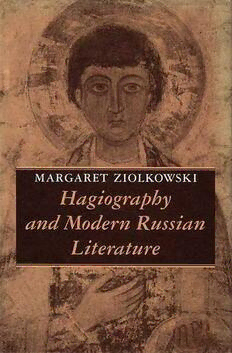
Hagiography and Modern Russian Literature PDF
Preview Hagiography and Modern Russian Literature
Hagiography and Modern Russian Literature MARGARET ZIOLKOWSKI Hagiography and Modern Russian Literature PRINCETON UNIVERSITY PRESS Copyright © 1988 by Princeton University Press Published by Princeton University Press, 41 William Street, Princeton, New Jersey 08540 In the United Kingdom: Princeton University Press, Guildford, Surrey All Rights Reserved Library of Congress Cataloging in Publication Data will be found on the last printed page of this book ISBN 0-691-06737-6 Publication of this book has been aided by a grant from The Andrew W. Mellon Foundation Acknowledgment is made to the American Association of Teachers of Slavic and East European Languages for permission to reproduce Chapter Two, "Hagiography and History. The Saintly Prince in the Poetry of the Decembrists," which appeared in a shorter form in Slavic and East European Journal 30, no. 1 (1986). 29-44, and for permission to reproduce Chapter Six, "Anti-Hagiography. Tolstoy's Assault on Orthodoxy," acknowledgment is made to South Atlantic Review (SAR), where portions originally appeared as "Hagiographical Motifs in Tolstoy's 'Father Sergius,' " SAR 47, no. 2 (1982)· 63-80 This book has been composed in Linotron Garamond Clothbound editions of Princeton University Press books are printed on acid-free paper, and binding materials are chosen for strength and durability. Paperbacks, although satisfactory for personal collections, are not usually suitable for library rebmding Printed in the United States of America by Princeton University Press, Princeton, New Jersey Designed by Laury A. Egan FOR MY PARENTS CONTENTS PREFACE IX NOTE ON TRANSLITERATION AND DATES XI ABBREVIATIONS XUi CHAPTER ONE: Introduction 3 CHAPTER TWO: Hagiography and History: The Saintly Prince in the Poetry of the Decembrists 34 CHAPTER THREE: Hagiography Revised: Adaptations of Legends and Tales 72 CHAPTER FOUR: Neo-Hagiography: The Saintly Monk and the Holy Fool in Modern Dress 121 CHAPTER FIVE: Hagiography and the Rigorous Hero: The Josephite Type in Later Russian Literature 190 CHAPTER Six: Anti-Hagiography: Tolstoy's Assault on Orthodoxy 218 CONCLUSION 246 INDEX 255 VI t PREFACE JN ο ONE contemplating the embalmed body of Vladimir Lenin lying in state in its tomb on Red Square can doubt the lasting importance of the figure of the saint for Russian culture. Yet in the course of my reading of nineteenth- and twentieth-century Russian novels, stories, and poetry, I became convinced that the impact of hagiography, of the multifarious literature devoted to saints, on modern Russian literature has been both greatly underestimated and tremendously neglected by literary scholars. Examples of the influence of hagiographic writings on individual authors and works are often cited, but the vast extent of this literary phenomenon is nowhere adequately described. In part this reflects lingering prejudices regarding the quality and significance of medieval Slavic literature. In writing the following pages, I have attempted to produce a dis cussion suitable for a general audience. However, my work assumes some familiarity with the broad outlines of Russian literature of the past two centuries. Its major aim is the identification and analysis of the most common types of usage of hagiographical material by Russian writers, as well as the variety of purposes that inspired this exploitation of their cultural past. In pursuing this aim, I did not attempt to pro duce a definitive, comprehensive structural analysis of the genre of hag iography; this would be the task of another, very different book. Rather, my focus is on the perception of hagiography by modern Rus sian writers themselves. What they regarded as worthy of imitation, or attack, and why—these are the questions I have tried to answer. In doing the research for this book, I was greatly aided by summer grants from the American Council of Learned Societies, the National Endowment for the Humanities, the American Philosophical Society, and the Kennan Institute for Advanced Russian Studies. My study of hagiography in particular was facilitated by postdoctoral fellowships from the International Research and Exchanges Board and the Andrew W. Mellon Faculty Fellowships in the Humanities at Emory Univer sity. As a graduate student, I was supported during the writing of my dissertation on the Life of a medieval saintly prince by a fellowship from the American Association for University Women. Since I first began to study Russian literary works, several scholars, all former teachers, have had an impact on the development of my inter ne PREFACE ests. My undergraduate adviser, Richard Burgi, first fostered my curi osity about the use of ancient and medieval literature by modern Rus sian writers. My dissertation director, Riccardo Picchio, helped me gain an appreciation of hagiography as a flexible and often sophisticated mode of expression. Victor Erlich provided a constant example of the merits of considering literary developments from a broad cultural per spective. More recently, at Princeton University Press I received sym pathetic readings for my work and many useful comments. While I have been engaged in the actual research and writing of this book, I have often turned to members of my family for advice and crit icism. My parents, Theodore and Yetta Ziolkowski, and my husband, Robert Thurston, read drafts and made many helpful observations of both a specific and a general nature. My father's typological acuteness, my mother's emphasis on readability, and my husband's knowledge of Russian history were all greatly appreciated. Nor should I overlook the willingness of my brothers, Jan and Eric, to supply me with much needed library materials. My husband, my parents, and my brothers were all unfailingly encouraging during the various stages of this project, and for that I thank them. I also thank my husband for simply listening . . . and listening. χ
